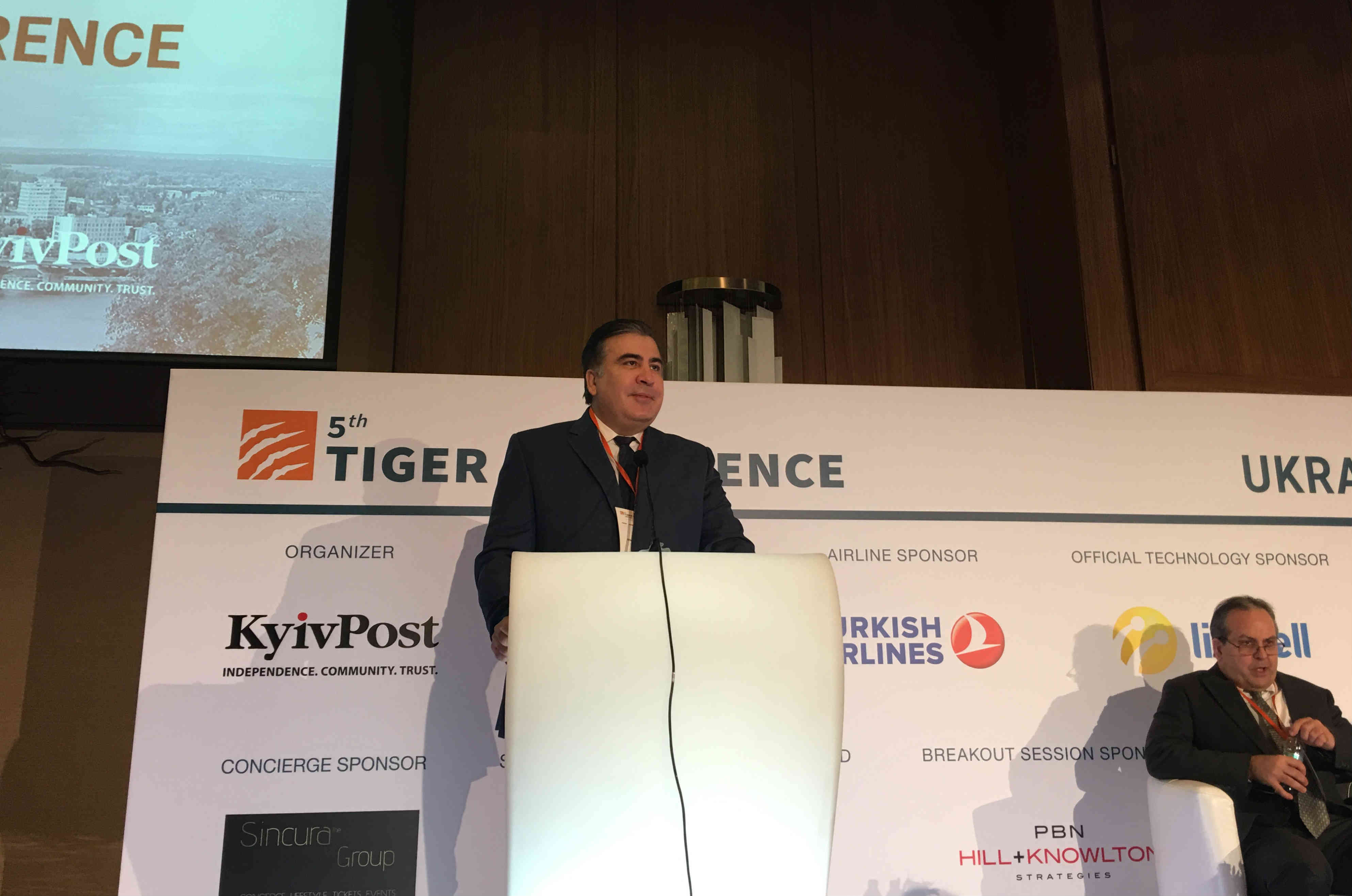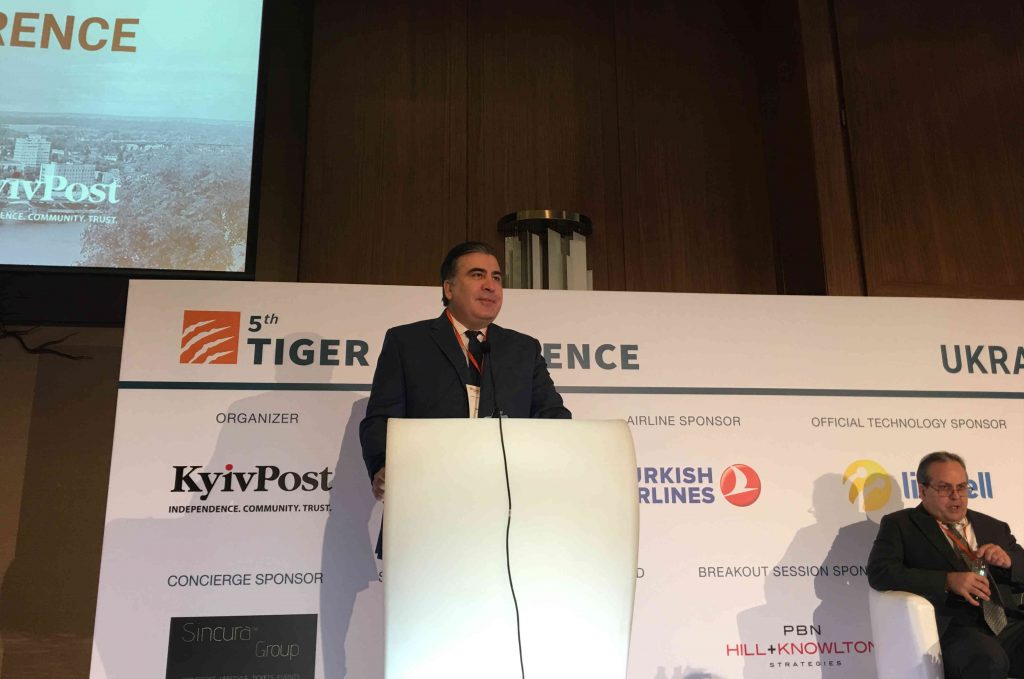 Former Georgia President Mikheil Saakashvili’s opening remarks at the Kyiv Post’s Tiger Conference on November 29 were puzzling. “Thanks for a couple of cameras,” he said.
Former Georgia President Mikheil Saakashvili’s opening remarks at the Kyiv Post’s Tiger Conference on November 29 were puzzling. “Thanks for a couple of cameras,” he said.
He was referring to the fact that even though he is a national figure with a resonant message in Ukraine, he’s the victim of a news blackout by the country’s oligarch-controlled TV media.
Such concentration of media ownership is one of the cornerstones of Ukraine’s pervasive corruption.
By contrast, the press has been focused for years on Saakashvili’s success in turning around Georgia through rapid reforms. In 2015, he was recruited by President Petro Poroshenko to bring about reforms as Governor of Odesa Oblast. But he quit this year after obstructionism made him realize it was too entrenched to change internally.
“I want to replace the entire political class. Elections happen and nothing changes, it gets worse. These guys have been around since the 1990s and they really think Ukraine’s their property. Twenty-five years of this political class and Ukraine has become the poorest country in Europe on a per capita GDP basis. After independence it was better off than Poland,” he said.
In 2016, Poland’s GDP was $467 billion in current prices, while Ukraine’s was $132.3 billion.
Saakashvili, by the way, is not running to be leader of Ukraine. He cannot become president because he was not born there, but his goal is to organize and enlarge the reform movement.
“I will never be president but there are already five or six people who could do this,” he said.
Interestingly, reaction from two other reformers at the conference was supportive. Member of Parliament Sergii Leshchenko said Saakashvili’s initiative is welcome as long as he remains “a partner or a mentor but not the leader,” while Ukraine’s former Minister of Economy and Trade Aivaras Abromavicius said Saakashvili was always a “team player” in Georgia.
Saakashvili is an outspoken critic and a controversial political figure whose reforms in Georgia were not replicated in Odesa. At present, his polling popularity in Ukraine is in single digits.
Inevitably, Saakashvili will overcome the blackout. He’s famous, and a darling of the foreign press for his success at fixing Georgia. He tripled the size of its economy and attracted significant foreign investment to rebuild infrastructure, hospitals, and export industries.
Now his attention is turned toward Ukraine where he’s studied and lived for many years. “Ukraine is approaching the turning point: The choice is reform or chaos. The status quo won’t hold,” he said.
In his brash remarks, he articulated what is on many people’s minds, namely that anger is palpable and Ukraine’s military superiority, in halting Russia’s occupation, could be turned toward forcing reforms.
“Two thousand armed people can take over every government building in Kyiv and if that happened, God forbid, people would give them flowers, especially if they jailed a few of the political elite,” he said.
Obviously, he added, “the better option is democracy” and he believes that a strong reform movement will lead to ethical candidates and mass voting support. This will happen, he said, even if there are early elections. “We only would need a few months to get ready,” he said.
The Euromaidan in 2014 was important but that “experiment didn’t work,” he said. “Privatization of state-owned enterprises must take place because these are not state enterprises. These businesses belong to the oligarchs.”
Legalizing the sale of farmland, as recommended by the IMF and others, would create an economic boom as it did in Poland and elsewhere, as long as the oligarchs weren’t allowed to snap up everything. There must be ownership limitations and owner registries.
Last month, the IMF bluntly refused to issue another tranche of funds from its $17.5 billion bailout of Ukraine because of the failure to tackle corruption and safeguard fiscal stability through privatization and land reform.
Echoing these frustrations was Morgan Williams, CEO of the US-Ukraine Business Council.
“The failure to have courts or laws that anyone can trust is why foreign direct investment is zero into Ukraine and will remain that way,” he said.
Another crippling effect of corruption was discussed during a panel on “asset recovery” involving the missing billions of dollars after former President Victor Yanukovych was driven out.
“That nothing has been recovered is proof that Ukraine is a dysfunctional state,” said Igor Budnik, director of the National Bank of Ukraine’s Risk Management Department.
Criminal and civil cases are not pursued, are stalled or halted by counter lawsuits waged by accomplices.
“In one case assets were frozen by a judge, then when the court was asked to enforce collection his supervisor overturned the decision,” he said. People are bribed to sit on cases.
Such crimes and malpractice drove Saakashvili, Abromavicius, and others from office, leaving only a sweeping victory by reformers at the ballot box as a solution.
“Here nothing changes because it’s the same political class,” Saakashvili said. “The oligarchs decide which leader to create, who will get television coverage, who will be censored, who elevated and who downgraded. That’s why the last weeks’ TV coverage of what I’ve been doing is zero.”
Clearly, Ukrainians need a movement to dismantle the “state capture” nature of governance that perpetuates systemic corruption.
An added advantage would be that then, and only then, can Russia be defeated both economically and militarily.
“No other country in Europe could have contained Russia as Ukraine has done,” said Saakashvili. “This could be a great European nation.”
Diane Francis is a Senior Fellow at the Atlantic Council’s Dinu Patriciu Eurasia Center, Editor at Large with the National Post in Canada, a Distinguished Professor at Ryerson University’s Ted Rogers School of Management, and author of ten books.
Image: Former Georgia President Mikheil Saakashvili speaks at the Kyiv Post’s Tiger Conference on November 29. Credit: Diane Francis
